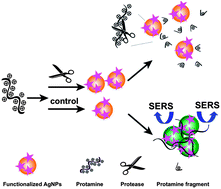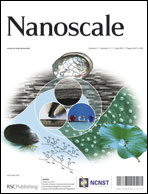In this work, a simple and sensitive surface-enhanced Raman scattering (SERS) strategy was developed for recognition and detection of trypsin, by using anti-aggregation of 4-mercaptopyridine (4-MPY)-functionalized silver nanoparticles (AgNPs) based on the interaction between protamine and trypsin. The polycationic protamine not only served as a substrate for enzyme hydrolysis but also worked as a medium for SERS enhancement, which could bind negatively charged 4-MPY-functionalized AgNPs and induce their aggregation. The hydrolysis catalyzed with trypsin in sample solution decreased the concentration of free protamine, resulting in the dispersion of AgNPs and thus decreasing the Raman intensity of 4-MPY, by which the trypsin could be sensed optically. A detection level down to 0.1 ng mL−1 for trypsin was obtained. The induced accumulation of AgNPs modified with Raman reporter 4-MPY largely enhanced the SERS responses. A good linearity was found within the wide range over five orders of magnitude and reasonable relative standard deviations (between 2.4 and 11.6%) were attained. By using trypsin as a model, the new concept can provide an excellent platform for ultrasensitive SERS measurements of various proteases/enzymes which can lead to nanoparticles stability change through catalyzed hydrolysis toward substrate.

You have access to this article
 Please wait while we load your content...
Something went wrong. Try again?
Please wait while we load your content...
Something went wrong. Try again?


 Please wait while we load your content...
Please wait while we load your content...